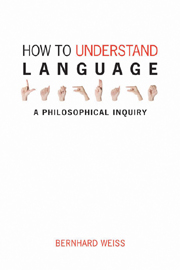Book contents
- Frontmatter
- Contents
- Preface
- 1 The puzzles of language
- 2 The starting-point for analysis
- 3 Analysing sentence-meaning
- 4 Analysing synonymy
- 5 Radical translation
- 6 The structure of a theory of meaning
- 7 Radical interpretation
- 8 Linguistic norms, communication and radical interpretation
- 9 Linguistic normativity
- 10 Radical or robust?
- 11 Language and community
- 12 Rules and privacy: the problem
- 13 Rules and privacy: the solution?
- 14 Truth-conditions versus use-conditions
- Notes
- Bibliography
- Index
3 - Analysing sentence-meaning
- Frontmatter
- Contents
- Preface
- 1 The puzzles of language
- 2 The starting-point for analysis
- 3 Analysing sentence-meaning
- 4 Analysing synonymy
- 5 Radical translation
- 6 The structure of a theory of meaning
- 7 Radical interpretation
- 8 Linguistic norms, communication and radical interpretation
- 9 Linguistic normativity
- 10 Radical or robust?
- 11 Language and community
- 12 Rules and privacy: the problem
- 13 Rules and privacy: the solution?
- 14 Truth-conditions versus use-conditions
- Notes
- Bibliography
- Index
Summary
Specifying sentence-meaning
What we wanted as a starting-point for analysis were ordinary sentences involving the ascription of meaning to a kind of linguistic expression. When we come to the case of sentences, it is hard to see how this would work if we focus on specifications of the form:
s means m.
What would we replace “m” by when, for instance, s is “snow is white”? One might just be prepared to contemplate the following:
“snow is white” means the state of affairs that snow is white.
Two things are worth noting: first, the notion of a state of affairs is a term of art invented as a way of conceiving of the meanings of sentences as some type of entity – a controversial proposal; and secondly, in characterizing states of affairs we have to use the “that” locution and this suggests taking a much more straightforward, less controversial set of sentences ascribing meaning to sentences. We might choose to focus on sentences such as
s means that p,
for instance, the true sentence,
“snow is white” means that snow is white
or the false sentence,
“snow is white” means that grass is green
Our aim would be to characterize what makes the first sentence true and what makes the second false. So our analysis attempts to fill out the question mark in
s means that p iff?
Grice (1957) offers us just such an account. The account is however complex, proceeding in two stages.
Information
- Type
- Chapter
- Information
- How to Understand LanguageA Philosophical Inquiry, pp. 33 - 56Publisher: Acumen PublishingPrint publication year: 2009
